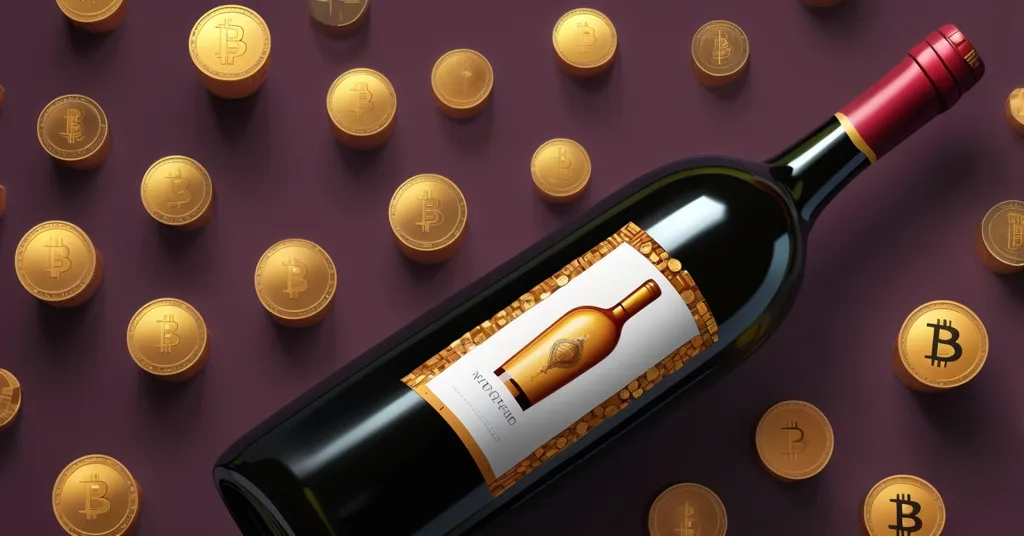Liquid Mercury and dVIN Labs Tokenize $300B Wine Market: Crypto Meets Fine Wine

Liquid Mercury and dVIN Labs Tokenize the $300 Billion Wine Market: A New Frontier in Cryptocurrency Investments
What if you could invest in fine wine as easily as buying bitcoin? Liquid Mercury and dVIN Labs are making it happen. Their new partnership aims to tokenize investment-grade wine, turning it into a liquid, tradable asset for a broader range of investors.
- Liquid Mercury and dVIN Labs announce strategic partnership
- Platform aims to tokenize investment-grade wine
- dVIN Protocol enhances transparency and liquidity
- Targeting a $300 billion market
Liquid Mercury, a seasoned player in the world of crypto trading and digital asset marketplaces, has teamed up with dVIN Labs, a trailblazer in revolutionizing the wine industry through blockchain technology. Their mission? To democratize access to the lucrative $300 billion investment-grade wine market. By tokenizing wine, they aim to make it as easy to invest in as your favorite stock or cryptocurrency.
David Garrett, co-founder and co-CEO of dVIN Labs, is bullish on the potential impact of this venture.
“The $300 billion investment-grade wine market is ready to be exposed to new investors and to become a liquid, tradable asset.”
He further emphasizes the goal of the partnership:
“Our goal is to make investing in wine as easy and efficient as investing in your favorite stock, cryptocurrency, or other favorite asset.”
This isn’t just about sipping fine wine; it’s about making it a viable investment option for everyone.
On the other side of the partnership, Tony Saliba, CEO of Liquid Mercury, is equally excited.
“Liquid Mercury is thrilled to partner with dVIN to unlock wine as an investment and tradable asset to millions of new investors.”
He highlights the broader trend of investing in culture:
“Our thesis for real-world assets has been that investing in culture is a powerful secular trend, and we know our battle-tested technology can reliably power new digital marketplaces, so we see massive potential in this partnership.”
The dVIN Protocol Explained
The dVIN Protocol is at the heart of this initiative, leveraging data, DePIN (Decentralized Physical Infrastructure Networks), DeFi (Decentralized Finance), and tokenization to bring wine on-chain. Tokenization is the process of converting rights to an asset into a digital token that can be traded on a blockchain, making the asset more liquid and accessible. DePIN refers to blockchain-based systems that manage physical assets, while DeFi uses blockchain to recreate traditional financial systems in a decentralized manner. This approach not only enhances transparency and authenticity but also boosts liquidity by bringing together different wine markets into one platform. Meanwhile, Liquid Mercury will support the global order book and provide white-labeled platforms for dVIN’s channel partners, ensuring that individual investors can easily jump into the wine investment game.
How Tokenization Works
Tokenizing wine involves several steps. First, dVIN Labs verifies the authenticity and provenance of the wine, ensuring that each bottle is investment-grade. Next, they create a digital token representing ownership of that wine, which is then recorded on the blockchain. This token can be bought, sold, and traded like any other digital asset. The process not only makes wine a more liquid asset but also opens up new investment opportunities for both retail and institutional investors.
Risks and Rewards
While tokenized wine offers exciting opportunities, it’s not without its risks. Market volatility can affect wine prices, and regulatory hurdles may pose challenges to widespread adoption. Potential investors must conduct thorough research to understand the intricacies of this market. However, for those willing to navigate these waters, the potential rewards could be as rich as a well-aged Bordeaux. Don’t get too drunk on the hype; remember to read the fine print before investing in tokenized wine.
Broader Implications
This partnership isn’t just a drop in the bucket. It’s part of a larger wave in the cryptocurrency and blockchain world, where tokenizing real-world assets is becoming increasingly popular. From PhillipCapital’s En Primeur tokens to Robert Mondavi Winery’s NFT-linked wine bottles, the industry is showing that anything can be tokenized—and wine is just the latest frontier. This trend reflects the broader movement towards leveraging blockchain technology to create new investment opportunities in traditionally niche markets.
Key Takeaways and Questions
What is the purpose of the partnership between Liquid Mercury and dVIN Labs?
The purpose is to launch a platform for trading tokenized investment-grade wine, aiming to increase liquidity and accessibility for investors.
How will the dVIN Protocol enhance the wine market?
The dVIN Protocol will use blockchain technology to improve transparency, authenticity, and liquidity in the wine market by tokenizing wine and creating a unified global order book.
Who are the target investors for the new wine trading platform?
The platform targets both retail and institutional investors, aiming to democratize access to wine investments.
What role does Liquid Mercury play in the partnership?
Liquid Mercury will power the global order book for the platform, provide white-labeled platforms for dVIN’s channel partners, and support the aggregation of regional marketplaces to optimize prices.
What is the estimated size of the investment-grade wine market?
The investment-grade wine market is estimated to be valued at $300 billion.
How does this partnership reflect broader trends in the cryptocurrency and blockchain industry?
It reflects the trend of tokenizing real-world assets to enhance liquidity and accessibility, leveraging blockchain technology to create new investment opportunities in traditionally niche markets.
In a world where decentralization and disruption are the order of the day, the partnership between Liquid Mercury and dVIN Labs is a toast to the future of investment. Whether you’re a crypto enthusiast or a wine aficionado, this is one development worth raising a glass to—just don’t forget to keep an eye on the fine print.



